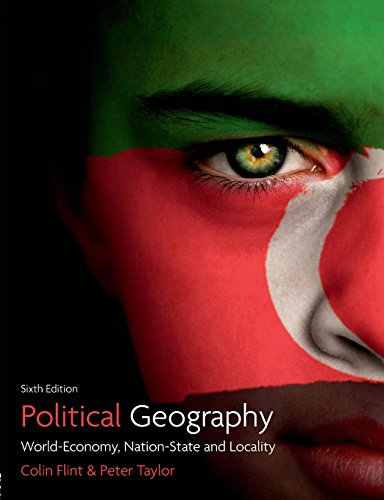We live in a rapidly changing world in which politics is becoming both more and less predictable at the same time: this makes political geography a particularly exciting topic to study.
To make sense of the continuities and disruptions within this political world requires a strongly focused yet flexible text. This new (sixth) edition of Peter Taylors Political Geography proves itself fit for the task of coping with a frequently and rapidly changing geo-political landscape. Co-authored again with Colin Flint, it retains the intellectual clarity, rigour and vision of previous editions, based upon its world-systems approach.
Reflecting the backdrop of the current global climate, this is the Empire, globalization and climate change edition in which global political change is being driven by three related processes: the role of cities in economic and political networks; the problems facing territorially based notions of democratic politics and citizenship, and the ongoing spectre of war.
This sixth edition remains a core text for students of political geography, geopolitics, international relations and political science, as well as more broadly across human geography and the social sciences.
We live in a rapidly changing world in which politics is becoming both more and less predictable at the same time: this makes it a particularly exciting topic to study. To make sense of the continuities and disruptions within this political world requires a strongly focused yet flexible text. This new (sixth) edition of Peter Taylor?s seminal Political Geography proves itself fit for the task of coping with a frequently and rapidly changing geopolitical landscape. Co-authored again with Colin Flint, it retains the intellectual clarity, rigour and vision of previous editions, based upon its world-systems approach.
Reflecting the backdrop of the world against which it is written, this is the Empire, globalization and climate change edition in which global political change is being driven by three related processes: the role of cities in economic and political networks; the problems facing territorially based notions of democratic politics and citizenship, and the ongoing spectre of war.
New to this edition
- A new section on citizenship
- A new section on social movements
- Emphasis on the key role of world cities in shaping the political geography of the world
- A prologue that provides a brief and pointed history of political geography
- An epilogue that summarizes the framework adopted throughout the book and assists readers in applying it to interpret their changing world
Key features
- Extensive coverage of and commentary upon the principal events and challenges of today?s world - political violence and terrorism, imperialism, ecological disaster, economic inequity, and exclusionary and fundamentalist attitudes towards nationalism and religion
- Case studies help ground the theoretical argument in the real world
- Concise vignettes show events of key political importance as presented in the media
- Mid- and end-of-chapter summaries make the information more digestible and navigable
- Activities and further reading to guide readers through their own exploration of the book?s topics
- A glossary of key terms to aid understanding and help facilitate revision of the subject.
This sixth edition remains a core text for students of political geography, geopolitics, international relations and political science, as well as more broadly across human geography and the social sciences.
Colin Flint is Associate Professor of Geography at the University of Illinois, Urbana-Champaign, USA
Peter Taylor is Professor of Human Geography, School of Built and Natural Environment, Northumbria University, Newcastle upon Tyne, UK
